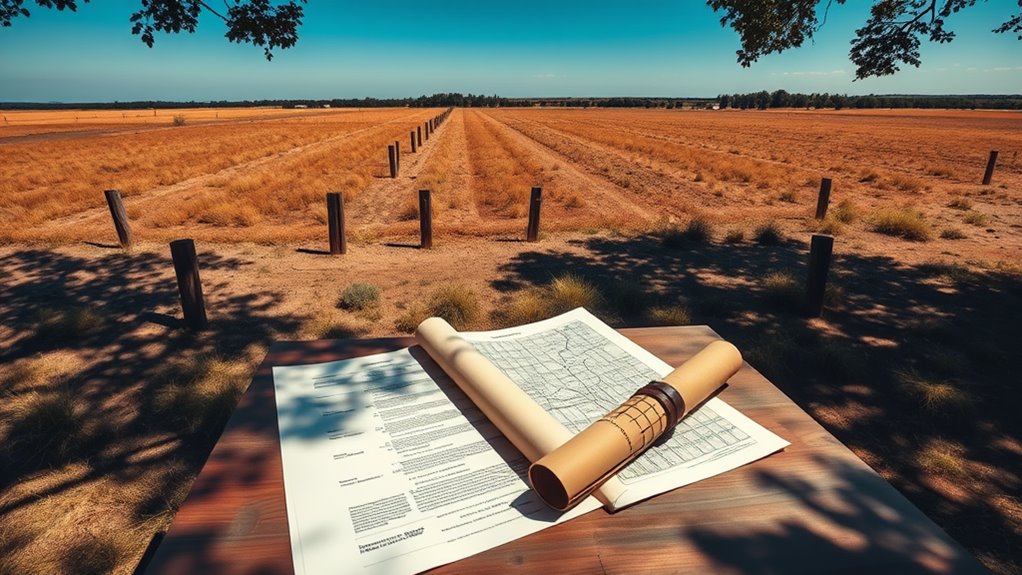A land deals wholesaler connects motivated sellers with buyers, focusing on undervalued or distressed properties at 20%-50% below market value. You’ll need strong negotiation skills, knowledge of zoning laws, and effective marketing strategies to succeed. Targeting emerging areas with high development potential can yield lucrative returns. Environmental impact assessments and clear property titles are essential to avoid legal issues. Understanding local market trends and building a robust network enhances your profitability. Explore further to uncover advanced strategies for maximizing your land wholesaling success.
Key Takeaways
- Secure land at below-market prices by targeting distressed sellers or undervalued properties for quick resale.
- Focus on vacant lots and emerging areas with high development potential for profitable transactions.
- Understand local zoning laws and land-use regulations to ensure compliance and maximize property utility.
- Build a network of investors, developers, and agents to facilitate smooth assignments of land contracts.
- Conduct thorough title checks and environmental assessments to avoid legal disputes and ensure clear ownership.
Understanding the Role of a Land Deals Wholesaler
Because land deals wholesaling doesn’t require ownership, it’s a streamlined way to profit from real estate. As a wholesale, you act as a middleman, identifying undervalued or distressed investment properties and negotiating purchase contracts. You don’t hold the land; instead, you assign the contract to a buyer for a fee, typically 5% to 10% of the property price. This model minimizes financial risk since you avoid ownership costs like taxes or maintenance. You’ll focus on locating vacant lots, raw land, or properties in emerging areas where demand is growing. Wholesaling provides low barriers to entry, as you don’t need a real estate license, making it accessible for new investors. Your role hinges on market research, negotiation skills, and building relationships with sellers and buyers. By leveraging these strategies, you can generate consistent income while remaining agile in the real estate market. Utilize tools like zoning maps and government websites to identify properties with potential for rezoning or development.
Key Steps in the Land Wholesaling Process

You identify motivated sellers by networking, leveraging online platforms, and conducting direct outreach to target distressed or undervalued land properties. Once you’ve sourced potential deals, you negotiate purchase agreements at below-market prices, often using cash offers or quick closing timelines to secure favorable terms. Utilizing public records to uncover ownership details and distressed opportunities further enhances your ability to find undervalued properties. These strategies position you to maximize profitability while minimizing initial investment costs.
Finding Motivated Sellers
To identify motivated sellers in land wholesaling, start by researching property tax records to spot landowners with delinquent or excessive tax burdens. These individuals are often enthusiastic to sell their investment property to relieve financial strain. Next, target absentee landowners or inherited property owners through direct mail campaigns, as they may lack interest or resources to manage the land. Networking with local real estate agents, attorneys, and investors can uncover off-market deals and connect you with sellers seeking quick transactions. Drive through areas of interest to spot neglected or abandoned parcels; these often signal ownership challenges. Finally, leverage online platforms and databases to identify foreclosed or distressed land listings. Collaborating with real estate attorneys can provide early access to distressed properties and enhance your deal flow. Combining these methods increases your chances of finding motivated sellers ready to negotiate.
Negotiating Purchase Agreements
When negotiating purchase agreements in land wholesaling, it’s essential to approach the process with a strategic mindset grounded in research. Start by analyzing the property’s market value and zoning restrictions to inform your offer. Present a lower initial bid to create room for counteroffers, ensuring you maximize profit margins. Leverage seller motivations, such as financial distress or disinterest, to secure a favorable purchase price. Incorporate contingencies like inspections or feasibility studies to safeguard your investment. In Real Estate Deals, always aim to assign the purchase contract to a buyer at a higher price, ensuring a clear profit for your wholesaling fee. This structured approach minimizes risk and positions you to succeed in estate transactions, turning negotiations into profitable outcomes with precision and efficiency. Verify property boundaries in the deed to avoid disputes and ensure compliance with local zoning laws.
Essential Skills for Successful Land Wholesaling

While securing land deals at below-market prices hinges on strong negotiation skills, achieving success in land wholesaling requires a multifaceted approach. Mastery of real estate investing begins with understanding how to evaluate properties for buildability and future value. You’ll need to grasp local zoning laws and land-use regulations to avoid costly mistakes. Effective marketing is equally critical; targeted online campaigns and direct mail can increase visibility, attracting motivated sellers and buyers. Building a robust network guarantees a steady pipeline of opportunities, narrowing the gap between supply and demand. Tracking and analyzing returns meticulously helps you identify profitable trends, refining your investment strategies over time. With discounts often ranging between 20%-50%, negotiation remains a cornerstone, but combining it with these skills maximizes your potential in land wholesaling. Additionally, leveraging tools like the sales comparison approach can provide accurate estimates of land value based on recent sales of similar properties. Focusing on these fundamentals positions you to thrive in this competitive field.
Market Opportunities and Challenges in Land Wholesaling

Land wholesaling offers substantial profit potential, with vacant land typically selling for 20%-50% below market value, but it also presents unique challenges. Market trends show that targeting distressed sellers can secure below-market prices, creating significant margins for your real estate investment. Emerging areas with high development potential are particularly lucrative, as they attract buyers seeking long-term appreciation. However, zoning restrictions and permitting costs can limit your buyer pool and increase risks, requiring thorough due diligence. Direct seller-buyer negotiations streamline transactions, reducing intermediary costs and enhancing profitability. Yet, you must navigate these deals carefully, as land often lacks the immediate income streams of developed properties. Balancing these opportunities and challenges guarantees you capitalize on the growing demand for land while mitigating potential setbacks. Staying informed about local market trends and buyer preferences is essential to maximizing your success in this competitive field.
Legal and Regulatory Considerations for Land Deals

You must verify zoning laws to guarantee the land aligns with your intended use, as zoning violations can halt development. Conduct a thorough title search to confirm ownership clarity and identify any liens or encumbrances that could disrupt the transaction. Additionally, assess environmental impacts early to avoid costly liabilities linked to contamination or protected land disputes. Understanding price per acre from comparable sales can provide valuable insights into current market conditions and buyer willingness to pay for similar properties.
Zoning and Permits
When acquiring land, understanding zoning regulations is critical, as they determine allowable uses like residential, commercial, or agricultural activities. Zoning laws vary by municipality, and violating them can lead to fines, delays, or even demolition of non-compliant structures. You’ll need to secure permits for development, which often involve environmental assessments, adherence to building codes, and public hearings. Special use permits may be required for activities such as farming or operating a business. Subdividers must comply with local zoning laws, including minimum lot sizes and infrastructure requirements, to ensure project feasibility. Before purchasing, consult local planning departments to verify zoning classifications and permit requirements.
- Unexpected roadblocks: Delays in permitting can halt your project indefinitely.
- Financial penalties: Non-compliance with zoning laws can result in hefty fines.
- Lost opportunities: Misunderstanding land use restrictions can render your investment unusable.
Failing to address zoning laws and permits upfront can jeopardize your land deal.
Property Title Checks
Before finalizing any land deal, it’s vital to perform a property title verification to identify any possible legal or financial hurdles. In real estate investing, conducting a property title check guarantees no liens, encumbrances, or unresolved claims exist, safeguarding your investment. Verify zoning regulations and land use restrictions to confirm the property aligns with your intended purpose, whether residential or commercial. A thorough title search reduces risks by identifying easements, encroachments, or disputes that could jeopardize your project. Additionally, securing title insurance protects against unforeseen title defects or disputes post-purchase. Always confirm the property has a clear and marketable title to facilitate a smooth transaction and avoid future legal complications. These steps are essential to mitigate risks and maximize the viability of your real estate investment.
Environmental Impact Assessments
While securing a clear property title is critical, ensuring compliance with environmental regulations through an Environmental Impact Assessment (EIA) is equally essential for land development projects. EIAs evaluate potential impacts on soil, water, air quality, wildlife, and ecosystems, ensuring sustainable land use and adherence to local, state, and federal laws. In the U.S., frameworks like the National Environmental Policy Act (NEPA) often mandate EIAs for deals involving federal funding or permits. Skipping or ignoring an EIA can lead to legal penalties, project delays, or permit denials, derailing your development plans. Public consultation phases within EIAs allow you to address community concerns, fostering trust in the local market and smoothing project approvals.
- Preserve ecosystems by identifying and mitigating harmful impacts.
- Avoid costly delays by adhering to regulatory requirements.
- Build community trust through transparent public engagement.
Building a Network for Land Wholesaling Success

To build a successful network for land wholesaling, you’ll need to prioritize strategic connections and reliable partnerships. Start by cultivating strong relationships with local real estate agents and brokers, as they often have access to off-market land deals. Attend real estate investment clubs and seminars to foster connections with motivated sellers and buyers, expanding your pool of potential wholesale deals. Utilize social media platforms like Facebook and LinkedIn to increase visibility and attract Real Estate Investors. Establishing a reputation for reliability and transparency encourages referrals and repeat business, which are essential for sustaining long-term success. Collaborate with title companies and attorneys to guarantee smooth transactions, building trust within your network. By focusing on these key areas, you’ll create a robust network that enhances your ability to identify and close profitable land opportunities efficiently.
Conclusion
Mastering land wholesaling demands strategic planning, a robust network, and a deep understanding of market dynamics. You’ll need to analyze data, navigate legal complexities, and seize opportunities while mitigating risks. Why not leverage your skills to turn undervalued properties into profitable deals? By refining your approach and staying ahead of trends, you’ll position yourself as a key player in this competitive industry. Stay focused, adaptable, and results-driven to succeed.




